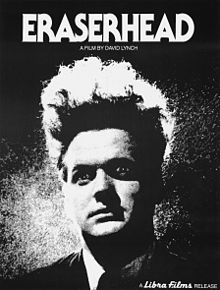Eraserhead
| Eraserhead | |
|---|---|

Film poster
|
|
| Directed by | David Lynch |
| Produced by | David Lynch |
| Written by | David Lynch |
| Starring |
|
| Music by |
|
| Cinematography |
|
| Edited by | David Lynch |
|
Production
company |
|
| Distributed by | Libra Films International |
|
Release date
|
|
|
Running time
|
88 minutes |
| Country | United States |
| Language | English |
| Box office | $7 million |
| Eraserhead | |
|---|---|
| Soundtrack album by David Lynch, Peter Ivers and Fats Waller | |
| Released | 1982 |
| Recorded | 1976–1977 |
| Length | 37:47 |
| Label | I.R.S. |
| Professional ratings | |
|---|---|
| Review scores | |
| Source | Rating |
| AllMusic | |
| Pitchfork Media | 8.8/10 |
Eraserhead is a 1977 American surrealist body horror film written, produced, and directed by filmmaker David Lynch. Shot in black-and-white, Eraserhead is Lynch's first feature-length film, coming after several short works. The film was produced with the assistance of the American Film Institute (AFI) during the director's time studying there. Starring Jack Nance, Charlotte Stewart, Jeanne Bates, Judith Anna Roberts, Laurel Near, and Jack Fisk, it tells the story of Henry Spencer (Nance), who is left to care for his grossly deformed child in a desolate industrial landscape. Throughout the film, Spencer experiences dreams or hallucinations, featuring his child and the Lady in the Radiator (Near).
Eraserhead spent several years in principal photography because of the difficulty of funding the film; donations from Fisk and his wife Sissy Spacek kept production afloat. The film was shot on several locations owned by the AFI in California, including Greystone Mansion and a set of disused stables in which Lynch lived. Lynch and sound designer Alan Splet spent a year working on the film's audio after their studio was soundproofed. The film's soundtrack features organ music by Fats Waller and includes the song "In Heaven", penned for the film by Peter Ivers.
Initially opening to small audiences and little interest, Eraserhead gained popularity over several long runs as a midnight movie. Since its release, the film has earned positive reviews. The surrealist imagery and sexual undercurrents have been seen as key thematic elements, and the intricate sound design as its technical highlight. Thematic analysis of the film has also highlighted these issues and has elaborated on Spencer's fatalism and inactivity. In 2004, the film was preserved in the National Film Registry by the United States Library of Congress as being "culturally, historically, or aesthetically significant".
...
Wikipedia
